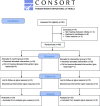Do the patient education program and nurse-led telephone follow-up improve treatment adherence in hemodialysis patients? A randomized controlled trial
- PMID: 33827478
- PMCID: PMC8028152
- DOI: 10.1186/s12882-021-02319-9
Do the patient education program and nurse-led telephone follow-up improve treatment adherence in hemodialysis patients? A randomized controlled trial
Abstract
Background: End-Stage Renal Disease (ESRD) is the final and permanent stage of Chronic Kidney Disease (CKD). Hemodialysis (HD) is the most common treatment for CKD. To have desirable therapeutic outcomes, patients have to adhere to a specific therapeutic regimen that reduces the hospitalization rate and side-effects of HD. The present study aimed to determine the effects of the patient education program and nurse-led telephone follow-up on adherence to the treatment in hemodialysis patients.
Methods: This is a randomized controlled trial in which a total of 66 patients were recruited using convenience sampling and then randomly assigned to two groups of control (n = 33) and intervention (n = 33). Data were collected using a demographic questionnaire, the laboratory results record sheet, and the End-Stage Renal Disease Adherence Questionnaire (ESRD-AQ), which included four dimensions of HD attendance, medication use, fluid restrictions, and diet recommendations. The intervention group received a patient education program and nurse-led follow-up services through telephone communication and the Short Message Service (SMS) for 3 months. All participants filled in the questionnaire before and after the intervention. Data were analyzed using IBM SPSS Statistics for Windows, version 25 (IBM Corp., Armonk, N.Y., USA).
Results: The results showed a significant difference in the mean scores of HD attendance, medication use, fluid restrictions, and diet recommendations between the two groups immediately, 1 month, and 3 months after the intervention (p < .001). The results also indicated a significant difference in the mean scores of four dimensions during the four-time points of measurement in the intervention group (P < 0.0005). Therefore, the level of treatment adherence in the intervention group was higher than in the control group. Moreover, there was a significant difference in the mean score of laboratory values between the two groups after the intervention, except for the level of serum sodium (P = 0.130).
Conclusion: Implementation of the patient education program and nurse-led follow-up can lead to better adherence to hemodialysis in four dimensions of HD attendance, medication use, fluid restrictions, and dietary recommendations in HD patients.
Trial registration: IRCT registration number: IRCT20190127042512N1 ; Registration date: 2020-09-12; Registration timing: retrospectively registered: Last update: 2020-09-12.
Keywords: Chronic kidney disease; Education; Hemodialysis; Patient; Tele-nursing; Trial.
Conflict of interest statement
The authors declare that they have no conflict of interest.
Figures
References
Publication types
MeSH terms
LinkOut - more resources
Full Text Sources
Other Literature Sources
Medical


